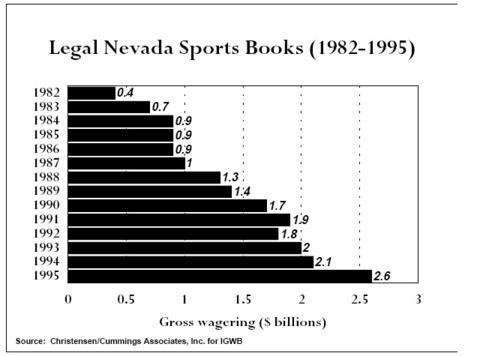The WAGER, Vol. 2(3) – Sports betting & the Super Bowl
In 1992 Congress passed the Amateur and Professional Sports Protection Act (also known as the Bradley Bill), which bans the establishment of sports betting facilities that didn’t exist prior to the passage of the Act. The Bradley Bill has effectively kept sports betting illegal in all but a few states. No legislation, however, seems effective in stopping illegal betting. Many speculate that the Super Bowl is the single most bet-upon event of the year. Estimating the precise amount bet illegally on the Super Bowl or other sports events is difficult. The Boston Globe reported that “some officials” estimated that in Massachusetts alone $100 million was illegally bet on the day of the 1993 Super Bowl*. Christiansen/Cummings Associates, Inc. estimated that in 1983, the amount spent on all illegal sports betting was $8 billion, which jumped to $29 billion by the end of the eighties, and catapulted to $88 billion in 1995**. Another way to estimate illegal sports betting is by investigating legal sports betting. Between 1982 and 1995 Las Vegas increased legal gross wagering by 550%. In 1995, 115 legal sports books grossed $2.6 billion. Future research will determine what percentage of legal sports betting is attributable to a single event such as the Super Bowl. An additional avenue for future research could be examining the factors determining who travels (either geographically or via Internet) to bet on sports legally, and who wagers illegally on sports events.

Image source: Christensen/Cummings Associates, Inc. for IGWB
Sources adapted from: *Sullivan, J. (1993, January 31). With Super Bowl, betting pools a sure thing. The Boston Globe, South Weekly Section, p. 1, **Doocey, P. (1996, April). The case for legal sports betting. International Gaming & Wagering Business, 17(4), pp. 1, 40-43.
This public education project is funded, in part, by The Andrews Foundation.